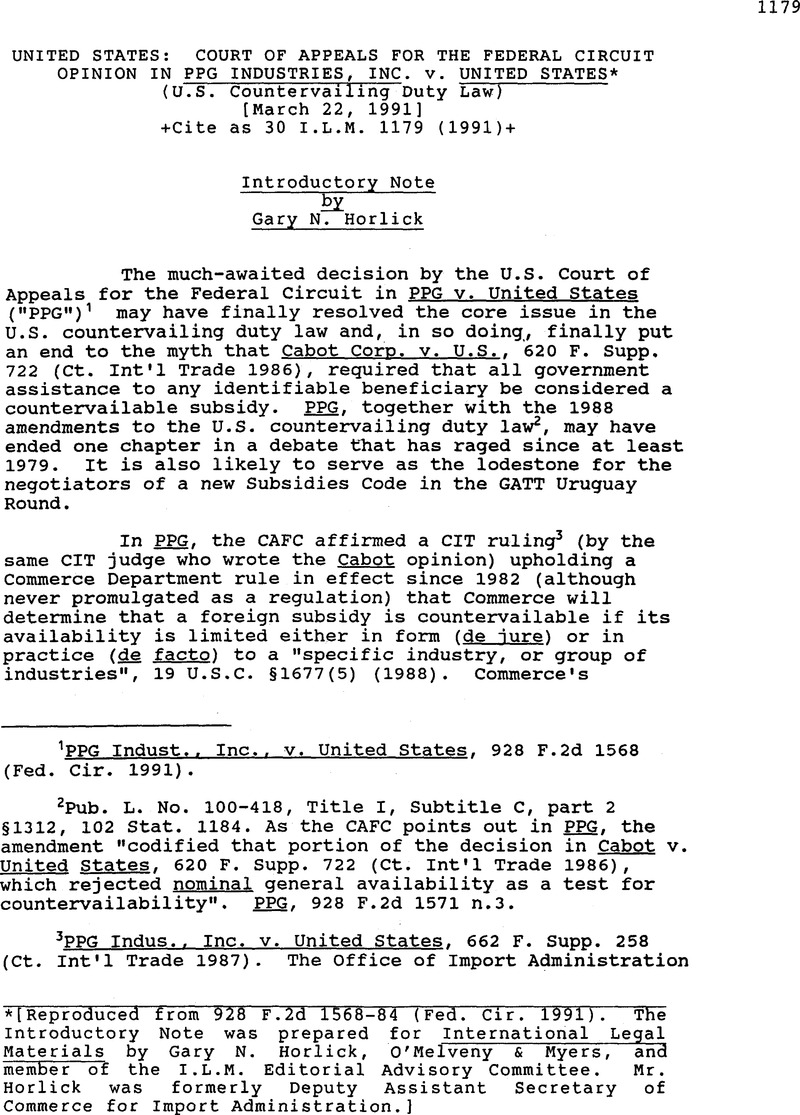No CrossRef data available.
Article contents
United States: Court of Appeals for the Federal Circuit Opinion in PPG Industries, Inc. v. United States (U.S. Countervailing Duty Law)
Published online by Cambridge University Press: 27 February 2017
Abstract

- Type
- Judicial and Similar Proceedings
- Information
- Copyright
- Copyright © American Society of International Law 1991
References
* [Reproduced from 928 F.2d :1568-84 (Fed. Cir. 1991) . The Introductory Note was prepared for International Legal Materials by Gary N. Horlick, O'Melveny&Myers, and member of the I.L.M. Editorial Advisory Committee. Mr. Horlick was formerly Deputy Assistant Secretary of Commerce for Import Administration.]
1 PPG Indust.. Inc.. v. United States. 928 F.2d 1568 (Fed. Cir. 1991).
2 Pub. L. No. 100418, Title I, Subtitle C, part 2 §1312, 102 Stat. 1184. As the CAFC points out in PPG, the amendment “codified that portion of the decision in Cabot v. United States. 620 F. Supp. 722 (Ct. Int'l Trade 1986), which rejected nominal general availability as a test for counter vailability”. PPG, 928 F.2d 1571 n.3.
3 PPG Indus.. Inc. v. United States. 662 F. Supp. 258 (Ct. Int'l Trade 1987). The Office of Import Administration of the International Trade Administration of the U.S. Department of Commerce (“Commerce“) is responsible for determining whether foreign subsidies are countervailable, and the U.S. International Trade Commission (“ITC“), is responsible for determining whether the subsidization has caused material injury. If both findings are affirmative, Commerce issues an order imposing countervailing duties on the imported merchandise. Decisions by Commerce and the ITC are appealable in the first instance to the U.S. Court of International Trade (“CIT“), and then to the U.S. Court of Appeals for the Federal Circuit (“CAFC“). 19 U.S.C. §1516A
4 Thus, the assertion in the PPG Dissent, 928 F.2d at 1581, that Commerce had never applied a de facto test prior to 1985 is incorrect. Certain politicians in the Administration and Congress found it convenient to so claim in 198586, as a pretext for the Commerce preliminary determination in October 1986, under enormous political pressure, to reverse its 1983 decision in Certain Softwood Products from Canada. 48 Fed. Reg. 24,159 (Dept't Comm. 1983) (Final Negative Countervailing Duty Determinations). Yet in that decision, which was upheld by the CIT, U.S. Coalition for Fair Canadian Lumber Imports v. United States. 563 F. Supp. 838 (Ct. Int'1 Trade 1983), Commerce expressly relied upon actual (de facto) use by a wider group of, inter alia, roads (48 Fed. Reg. at 24,172) and stumpage rights (48 Fed. Reg. at 24,167). See also Oil Country Tubular Goods from Korea. 49 FR 46,776, 46,779 (Dep't Comm. 1984).Commerce officials still feel the need to pay obeisance to the CIT by claiming that Commerce did not apply a de facto test before 1985, although they are well aware of the numerous cases expressly applying a de facto test from 1982 on. See Powell, Geisse, and Jackson, Current Administration of U.S. Antidumping and Countervailing Duty Laws; Implications for Prospective U.S.Mexico Free Trade Talks 11 N.W. J. Int.L.&BUS. 177, 237 (1990).
5 The reasoning underlying this interpretation is that, if a subsidy is used by a wide variety of industries within a country, there will not be a distortion of comparative advantage within that country in favor of the industry whose product(s) is under investigation.In addition, Commerce recognized that, in the absence of the specificity rule, all government intervention in the economy (including roads, schools, and so on, as well as such broadly spread programs as investment tax credits, all of which are common in the U.S.) could create benefits to their recipients, requiring countervailing duty investigations of all imports.
6 Conf. Rep. No. 576, 100th “Cong., 2d Sess. 587 (1988). See Horlick and Oliver, Antidumping and Countervailing Duty Law Provisions of the Omnibus Trade and Competitiveness Act of 1988, 23 J. World Trade L. 5,9 (1989).
* Chief Judge Nies assumed the position of Chief Judge on June 27, 1990.
** This case was heard prior to the time Senior Circuit Judge Smith took Senior status on June 1, 1989.
1 Mexico, at the time of this investigation, was not a “country under the Agreement [GATT subsidies code]”. Thus, Section 303 of the Tariff Act of 1930 (19 U.S.C. § 1303) applies in this case rather than the countervailing duty provisions implemented in the Trade Agreements Act of 1979 (19 U.S.C. §§ 16711677g).
2 This section was added by the Trade Agreements Act of 1979, Pub.I No. 9639, Title I, § 101, 93 Stat. 144, 176 in response to the U.S.'s adherence to the newly created “subsidies code” of the General Agreement on Tariffs and Trade (GATT). See PPG Indus., 662 F.Supp. at 262263. For a full explanation of the relationship between Section 1303 and the provisions added to conform U.S. law with the GATT Subsidies Code, see Bethlehem Steel Corp. v. United States, 7 CIT 339, 590 F.Supp. 1237, 123941 (1984)
3 This section was amended in 1988 by Pub.L. No. 100418, Title I, Subtitle C, part 2 § 1312, 102 Stat. 1184. This amendment added a “Special Rule” that precluded a determination that a benefit was not countervailable solely because it was “nominally generally available.” Inessence, it codified that portion of the decision in Cabot v. United States, 9 CIT 489, 620 F.Supp. 722 (1985), which rejected nominal general availability as a test for countervailability.
4 See J. Bello and A. Holmer, Subsidies and Natural Resources: Congress Rejects a Lateral Attack on the Specificity Test (hereinafter “Subsidies “ ), 18 Geo.WashJ. of Int'l Law & Economics 297, 30508 (1984) (Discussion of some of the congressional concerns for including “specificity” language).


